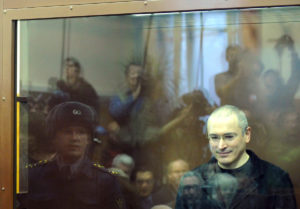Film Review: “Citizen K“ Masterfully Profiles a Russian Oligarch’s Rise and Fall
Written by: Christopher Llewellyn Reed | January 23rd, 2020

Citizen K (Alex Gibney, 2019) 4 out of 4 stars.
In 1985, Mikhail Gorbachev was elected General Secretary of the Communist Party of the Soviet Union, taking over an ailing system in dire need of reform. Few imagined that the changes he would implement – under the twin headings of “Glasnost” (“openness”) and “Perestroika” (“restructuring”) – would lead, by 1991, to the complete collapse of the country he led, but so they did, and the ensuing decade of chaos that followed left many Russians and other former Soviet citizens profoundly disillusioned with the promises of western capitalism, which they had assumed would follow the end of communism. The sclerotic rule of Boris Yeltsin, Russia’s first post-Soviet president, did not help matters. Nor did the growing influence of the new business elite, known as oligarchs, who quickly amassed enormous wealth by gaining control of the recently privatized former state-run industries. Their success was often at the expense of the welfare of ordinary folks drowning in the wild nihilism of the new era. Little did these freshly minted billionaires realize that their own time might soon be up.
For waiting in the wings, unseen by almost everyone until he somehow maneuvered himself into position as prime minister, and therefore heir apparent, in 1999, was Vladimir Putin. While at first both the oligarchs and general populace saw him as a steady hand that might right the listing ship of state, within a few years of his election as president in 2000, he had the billionaires in his sights, ostensibly worried about their corruption, but really concerned about threats to his own power. If they resisted his attempts to rein them in, his proxies filed criminal indictments, leading some to flee (later, perhaps, to be killed abroad under mysterious circumstances), and others to stay and do prison time. In ever-prolific documentarian Alex Gibney’s latest investigative film, Citizen K, we learn this entire history and its consequences for Russia’s nascent democracy. There’s a lot to take in, but it is all presented in a cogent manner with plenty of first-hand accounts to support the narrative.
The “K” of the title is Mikhail Khodorkovsky, once the richest man in Russia, now an exile (still rich) living in London, who was imprisoned from 2003 to 2013 on charges of corruption related to a proposed oil-company merger. By that time, Putin had already begun his takeover of the TV network, and was fast responding aggressively to any and all criticisms and attacks on his position, and Khodorkovsky made the mistake of openly challenging Putin. Unlike his similarly at-risk peers, however, Khodorkovsky chose to stay and face the music. A decade later, despite a subsequent trial that had landed him an additional sentence, Khodorkovsky was freed in the runup to the Sochi Olympics, after international pressure was applied on his behalf. Putin, wanting to put on a good face to the world so as to avoid any human-rights scandals that might get in the way of the perfect games, pardoned him. Today, Citizen Khodorkovsky uses what wealth he still has to fund Russian democratic movements from his home base in London.

Gibney (The Inventor: Out for Blood in Silicon Valley) loves complicated protagonists. In film after film, he has found himself drawn to hubris, whether it be that of the leaders of the ill-fated Enron, New York’s Eliot Spitzer, the disgraced bicyclist Lance Armstrong, or others. Here, he breaks his usual pattern since, though hubris certainly played a part in Khodorkovsky’s inability to recognize the danger posed by Putin, that is only part of the story. Gibney’s’ subject is as much victim as aggressor. As do all interesting dramatic heroes, Khodorkovsky has, whatever his status now as champion of democracy, a morally checkered past. There are indications, explored by Gibney, that he may have had a hand in the killing of the mayor of a city where his oil company’s headquarters were located. Or not. But he certainly engaged in highly exploitative practices throughout the 1990s, designed to enrich himself, others be damned.
In his talking-head interviews, Khodorkovsky is a charismatic screen presence. Gibney backs him up with a variety of equally compelling characters as contemporary witnesses and commentators, including British journalist and author Martin Sixsmith (he of Philomena fame), Russian journalist Tatyana Lysova, Khodorkovsky attorney Anton Drel and many more. Using evocative music and clever graphics that start in Cyrillic and quickly shift to Latin letters, the director moves the story along at a brisk pace. I often feel, watching Gibney’s work, that though the films fascinate, they often run a little long. Not so here, even though the movie clocks in at just over two hours. Given the density of the tale, we need that time, and no parts feel anything less than absolutely necessary. Think you know Russia? Think again. It may be, as Winston Churchill once said, “a riddle wrapped in a mystery inside an enigma,” but that clever phrase means nothing without explanatory details. In Citizen K, we get those details, and more. Putin’s Russia is a scary place. We have been warned.

